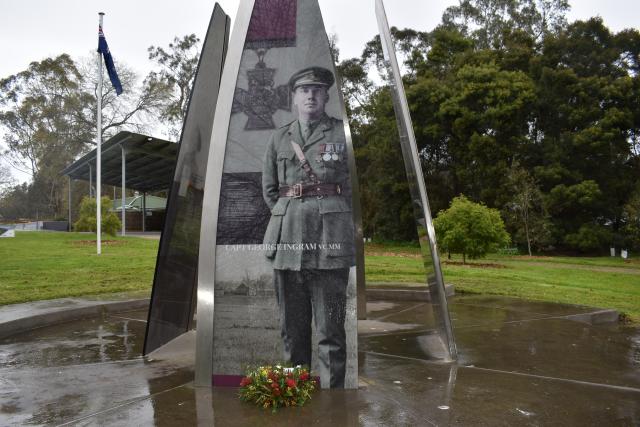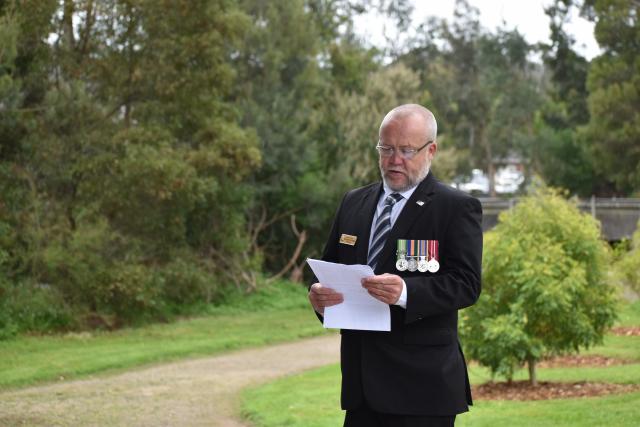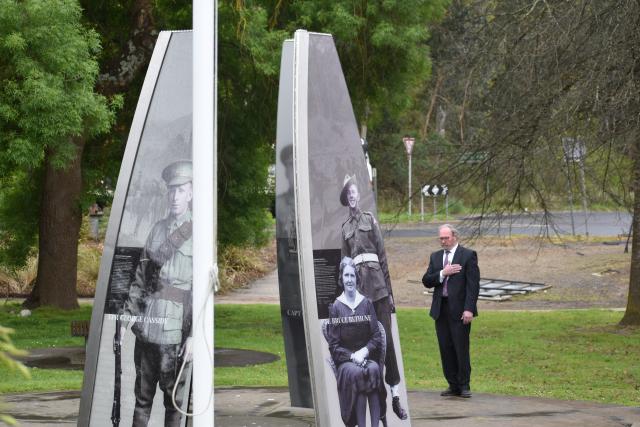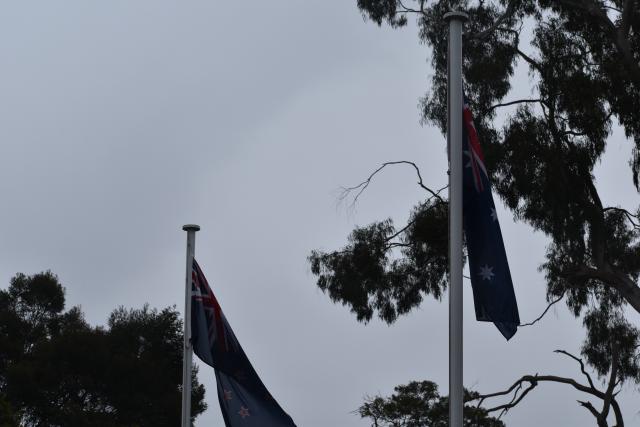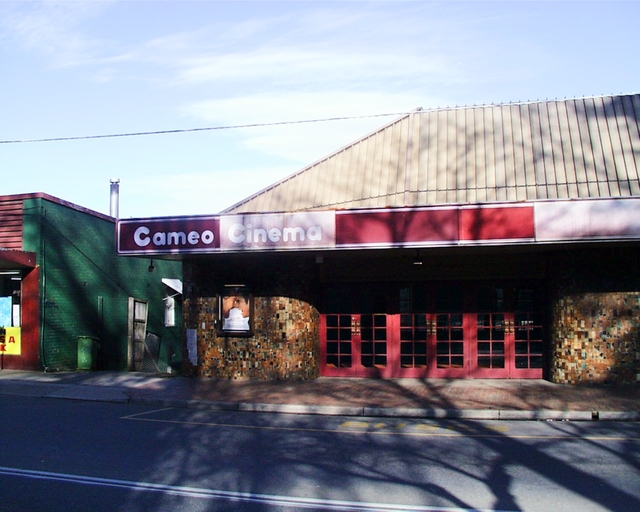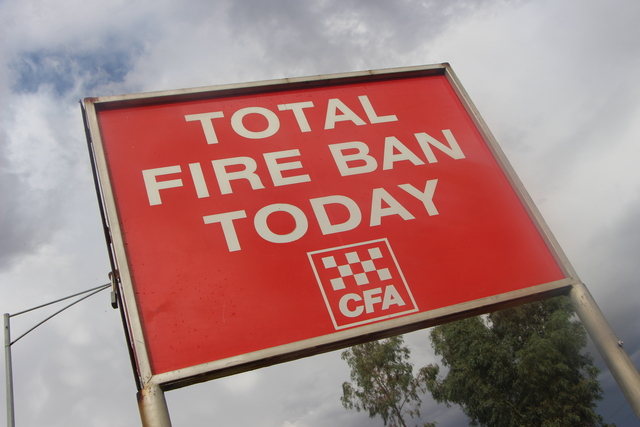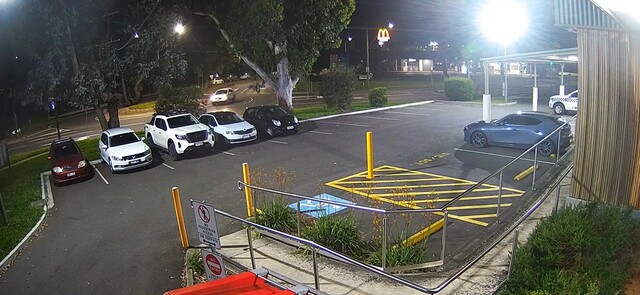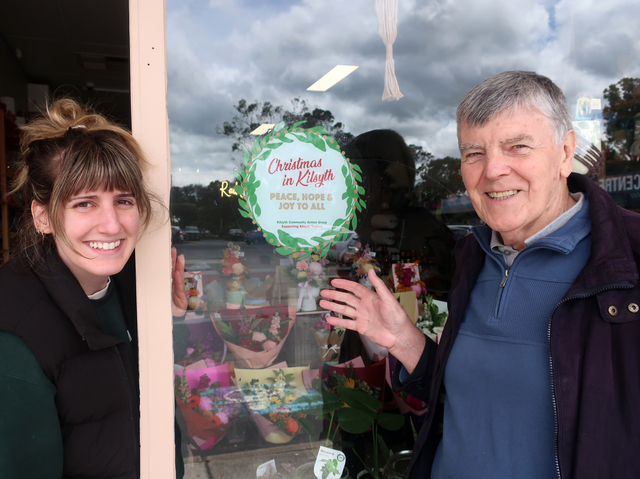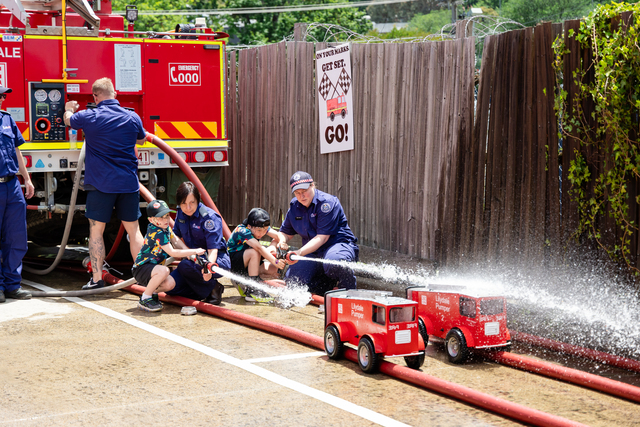The recently completed Seville War Memorial, 104 years to the day on from his Victoria Cross-worthy feats of bravery, hosted a memorial for former Seville resident and Lilydale RSL life member George Ingram.
George Ingram VC, MM grew up in Seville and became the Yarra Valley’s only Victoria Cross recipient and the 64th and last Australian to receive one during World War One.
After an introduction from Seville War Memorial Committee representative Derry Aulich, Casey MP Aaron Violi spoke about Ingram’s connection to Seville.
“It’s so important that we recognise and remember the people and events of our military past and that we honour those who sacrificed for the freedoms that we enjoy today. George grew up in Seville with his two brothers and attended Seville State School, now Seville Primary School. He began his military career in his late teens when he joined the militia and served in the Australian Garrison Artillery on the big guns down at Queenscliff,” he said.
“I’ve got a nine-year-old son and to think that in another world, some seven or eight years from now he would be off to serve the country and it really is incomprehensible in today’s society.”
Ingram joined the Australian Imperial Force when World War One began and was sent to Rabaul in the then-German-controlled part of Papua New Guinea and manned guns at Simpsons Harbour for a year before contracting malaria. He returned to service only a week later and was sent to the Western Front in Europe with the 24th Battalion.
Mr Violi said so many good mates of Ingram’s were lost in battles on the Western Front, including both his brothers Alex and Ronald.
“He returned here to Seville to a heroes’ welcome and public service at the local hall. He was an original member of the Shrine Guard, and he served once again in the Second World War before passing away in 1961,” he said.
“George showed courage and dedication of service to his country that in many ways is beyond the comprehension of modern society. The lives that we all live today in modern Australia are a direct result of the sacrifice of George and the millions of servicemen and women who have and continue to serve our nation to protect our freedoms.”
The panel of the Seville War Memorial dedicated to George Ingram VC MM faces in the direction of his childhood home.
President of Mt Evelyn RSL Matt Crymble encountered Ingram’s acts on October 5 that earned him the Victoria Cross and said on October 4 1918, the 24th Battalion had just come out of the Battle of Beaurevoir when they suddenly received word that there would be one more battle.
“At dawn the next day they were to attack the village of Montbrehain and take the high ground near it which was a strongly held German position that had just been reinforced by more troops. The hill was exceedingly rough and covered with wire. At 3am on October 5, they were ordered to prepare for an attack,” he said.
“From the outset the enemy fire was intense, and George was with the group in the centre of the advance. What happened next was to be George Ingram’s moment in history. He was in charge of a platoon and the advance was halted by severe enemy fire which left no choice but to charge. Under the cover of a Lewis Gun, George rushed the German post at the head of his men. These posts contained nine machine guns and 42 Germans, who fired at the Australians until they were no more than three feet away. A short, sharp hand-to-hand combat ensued and disposed of the Germans with George accounting for 18 himself.”
Ingram and the company then came under heavy fire from over 100 Germans and up to 40 machine guns in a quarry. Ingram jumped into the quarry, charging the first post himself, shooting six German soldiers and capturing a machine gun. The Germans were soon overcome and 30 men surrendered.
Ingram then scouted ahead alone for machinegun nests and located one in a house, firing from a cellar. Ingram entered the house and he shot the gunner through the cellar ventilator then took another 30 Germans, prisoner.
Mr Crymble said throughout the day, Ingram showed the most splendid qualities of courage and leadership and freely exposed himself to enemy fire again and again under contempt for the dangers faced.
“By his example, he encouraged his men to keep up a constant fire on the enemy, that not only did he leave me a large toll on of casualties upon them, but was responsible for destroying counter-attacks on each front,” he said.
“What George experienced on that day was horrific. He would have looked into the faces of many of the 40 enemy soldiers that he killed, no Victoria Cross is more soaked with blood. For the rest of his life, he could never bring himself to talk about the actions on that day.”
President of the Seville Township Group Graham Black laid a wreath at his panel on behalf of both the Lilydale RSL and Seville Township Group.

